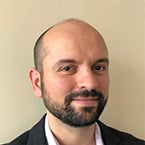AACR Career Development Awards to Further Diversity, Equity, and Inclusion
The AACR Career Development Awards to Further Diversity, Equity, and Inclusion in Cancer Research has been established to support the development of highly talented cancer researchers from under-represented groups (as per NIH guidelines). Eligibility is limited to members of racial or ethnic groups that have been shown to be underrepresented in the cancer related sciences.
2022 Grantees

Research
Previous studies have identified N-acetyltransferase 10 (NAT10) as an oncogenic driver in hepatocellular carcinoma (HCC). NAT10 is an evolutionarily conserved enzyme that regulates protein synthesis through the acetylation of RNA molecules. However, the mechanisms by which NAT10 promotes HCC, and the role of RNA acetylation in tumor formation remain poorly understood. This project will investigate how NAT10 promotes HCC growth, and regulates the response of hepatic cells to stress conditions. Dr. Arango hypothesizes that NAT10-catalyzed RNA acetylation rewires protein synthesis, providing a cancer-competent proteome that promotes cell proliferation and resiliency to stress conditions.
Biography
Dr. Arango received a B.S. in Biology from Universidad de Antioquia – Colombia, obtained a Ph.D. in Molecular Biology from The Ohio State University, and conducted postdoctoral training in RNA biology at the U.S. National Cancer Institute. He is currently an Assistant Professor in the Department of Pharmacology and the Robert H. Lurie Comprehensive Cancer Center at Northwestern University. His research program investigates how chemical modifications of RNA regulate protein synthesis and how this interplay affects cell fate decisions such as cell proliferation, cell differentiation, and cell death in cancer.
Acknowledgment of Support
I am thrilled and honored to receive the 2022 AACR Career Development Award to Further Diversity, Equity, and Inclusion in Cancer Research. This award inspires my research and mentoring goals, while providing a more diverse and inclusive environment in cancer research.

Research
The co-occurrence of KRAS and STK11 mutations in Non-Small Cell Lung Cancer (NSCLC) is associated with tolerogenic and immunotherapy-resistant cancers, leading to poor clinical outcomes for patients. The mechanisms by which KRAS/STK11 co-mutated NSCLC (KS-NSCLC) curtail anti-cancer immune activities remain unclear. Signaling extracellular vesicles (EV) are increasingly recognized as potent immune regulators. Data from Dr. Chabu’s laboratory show that EV isolated from NSCLC patients’ blood and KS-NSCLC cells specifically activate robust tolerogenic signals in immune cells. In this proposal, he and his research group will elucidate the impact of signaling synergy between KRAS and STK11 in EV-mediated immune suppression, and evaluate the therapeutic efficacy of blocking the downstream effects of this synergy in a mouse model of KS-NSCLC.
Biography
Dr. Chabu received his PhD from the University of Oregon/Howard Hughes Medical Institute (HHMI). He worked on understanding the molecular mechanisms controlling neuroblast cortical polarity and stemness. Afterward, Dr. Chabu completed his postdoctoral training at Yale University/HHMI, where he discovered novel RAS cell-cell signaling dynamics. He also found that oncogenic RAS triggers epithelial cells to release extracellular vesicles (EV) that fundamentally modulate the activity of tumor-associated immune cells in Drosophila. He is currently an Assistant Professor at the University of Missouri, where his interests include understanding the role of RAS tumors-derived EV in tumor immune escape and immunotherapy resistance.
Acknowledgement of Support
My team and I are grateful to the AACR for this Career Development Award! It is a true honor! This award will allow us to expand our work on RAS tumor EV signaling while continuing to actively promote inclusive excellence in cancer research.

Research
Progress in identifying novel therapeutics in pancreatic cancer has been limited for several reasons, including immunosuppressive factors from the tumor microenvironment (TME) and an abundant desmoplastic stroma composed of fibroblasts, endothelial cells, and extracellular matrix proteins. Dr. Nagalo’s laboratory recently engineered a hybrid vesiculovirus, replacing the viral surface glycoprotein (G protein) with that of the Morreton virus (shown to be well-tolerated in immunocompetent murine models). In this project, he aims to further genetically modify this hybrid virus, enabling it to degrade the stroma and overcome immunosuppression in the TME. In addition, he will test the benefit of blocking the activity of virus-neutralizing antibodies, on the hybrid virus anti-tumor efficacy. The results of his proposed work can provide the necessary safety and efficacy data to translate this approach to the clinic to treat pancreatic cancer and other stroma-dense tumors.
Biography
Bolni Marius Nagalo, Ph.D., received his bachelor’s degree, a master’s in molecular genetics, and a Ph.D. in molecular biology and infectious diseases from the University of Ouagadougou in Burkina Faso, West Africa. He completed a postdoctoral fellowship in the Department of Molecular Medicine at the Mayo Clinic in Rochester, Minnesota, and joined the Mayo faculty in Arizona as an Assistant Professor of Molecular Medicine and Oncology. He is currently an Assistant Professor of Pathology at the University of Arkansas for Medical Sciences (UAMS) and a member of the Winthrop P. Rockefeller Cancer Institute Cancer Biology Research Program.
Acknowledgment of Support
The AACR Career Development Award to Further Diversity, Equity, and Inclusion in Cancer Research, which is supported by Genentech, a member of the Roche Group, will support my research program’s goal to address the unmet clinical need of patients with advanced pancreatic cancer. It will also provide unparalleled opportunities for scientific nurturing and networking in the world’s largest cancer research community.

Research
Genes that encode RNA splicing factors are commonly mutated in myelodysplastic syndromes (MDS) and other hematological malignancies. Dr. Nguyen previously reported preclinical evidence that suggests that patients with MDS and other myeloid malignancies driven by splicing factor mutations, may benefit from inhibition of the ATR checkpoint kinase. The proposed studies in this award seek to uncover mechanistic insights on the efficacy of ATR inhibition in splicing factor mutant MDS. Dr. Nguyen hopes to provide potential therapeutic marker(s) and a new drug combination as targeted therapy for patients harboring splicing factor mutations.
Biography
Dr. Nguyen earned his PhD from the University of Minnesota and completed his postdoctoral training at Harvard Medical School and the Massachusetts General Hospital Cancer Center. By using a combination of genetic, molecular, and biochemical approaches, he demonstrated that inhibiting regulatory circuitry of R-loops, a three-stranded nucleic acid structure containing an RNA:DNA hybrid and a displaced single-stranded DNA, may be an effective targeted treatment approach for splicing factor mutant myelodysplastic syndromes (MDS) and other myeloid malignancies. He is currently an Assistant Professor at the University of Minnesota Medical School and a member of the Masonic Cancer Center. His laboratory aims to develop new experimental tools to reveal molecular mechanisms underlying R-loop response pathways in different cancers and seeks to apply this knowledge to design the next generation of targeted therapeutic strategies. He is committed to a career at the intersection of basic and translation cancer research, prioritizing discoveries that can be translated for diagnostic and therapeutic purposes.
Acknowledgement of Support
This award will allow me to represent our underrepresented research community in medicine, and to promote diverse and collaborative team science, with the goal of finding cures for cancers and alleviating health disparities in cancer patients.

Research
Neighborhoods are key determinants of health, and structural features of one’s social environment can impact health outcomes, regardless of race. The long-term goal of the Scott lab is to measure the impact of structural racism and other social factors on breast cancer etiology and outcomes and identify potential biological mechanisms that affect tumorigenesis and subsequent outcomes. The objective of this project is to quantify how structural racism and socioeconomic conditions contribute to racial and geospatial disparities in breast cancer incidence and mortality by subtype and other clinical characteristics at the individual and aggregate levels.
Biography
Dr. Scott received her PhD from Georgia State University, where she was an NIH Ruth L. Kirschstein National Research Service Award fellow. She completed her post-doctoral fellowship as a Steven M. Teutsch Prevention Effectiveness Fellow at the Centers for Disease Control and Prevention. She is currently an Assistant Professor in the Department of Population Health Sciences at Georgia State University, where her research aims to understand how structural and social factors impact breast cancer etiology, survival and mortality.
Acknowledgement of Support
I am deeply honored to receive the AACR Career Development Award to Further Diversity, Equity, and Inclusion in Cancer Research, which is supported by Merck. This support is integral to my career as an early-stage investigator. This grant will provide resources to carry out studies to understand structural drivers of breast cancer disparities.

Research
Dr. Vargas’s research focuses on endometrial cancer (EC), the most common form of gynecologic malignancy. His proposal focuses on tumors associated with the worst clinical outcomes, namely those with TP53 alterations in the “serous-like” biologic cluster and those which have developed resistance to conventional chemotherapies.
Biography
Dr. Vargas was born and raised in Ponce, Puerto Rico. He obtained his B.S. and M.D. at the Pennsylvania State University. After medical school, he completed his Obstetrics and Gynecology residency at the Harvard University combined training program at Brigham and Women’s Hospital/ Massachusetts General Hospital. He then completed a gynecologic oncology fellowship at The Cleveland Clinic. He has received a K12 award from the Case Comprehensive Cancer Center and currently serves as a board-certified gynecologic oncologist at The Cleveland Clinic.
Acknowledgment of Support
I am honored to be a recipient of the AACR Career Development Award to Further Diversity, Equity, and Inclusion in Clinical Cancer Research. This award will support our investigative work aimed at improving clinical outcomes for endometrial cancer, an understudied disease with a growing incidence and poorly understood clinical outcome.

Research
Recent years have seen significant progress in the development of novel biomarkers and therapies for non-small cell lung cancer (NSCLC). However, the clinical benefits of this progress have not been equally distributed across all patients and significant disparities persist in NSCLC care. Social needs (such as financial toxicity, housing or food insecurity) directly impact patients with cancer, yet little is known of the effect these unmet needs have on cancer care. The objectives of this study are to prospectively evaluate the burden of unmet social needs among patients with NSCLC, identify stakeholder priorities and resources needed to integrate social needs screening into NSCLC care, and develop and pilot test a social need screening intervention prototype.
Biography
Ana Velázquez Mañana, MD, MSc, completed her MD at the University of Puerto Rico School of Medicine, Master of Biomedical Science at Mayo Clinic Graduate School, and Internal Medicine residency at Mount Sinai Beth Israel, where she was a Chief Resident. She completed her clinical fellowship in Medical Oncology and postdoctoral fellowship at the National Clinician Scholars Program at UCSF. She is currently an Assistant Professor of Medicine in the UCSF Division of Hematology/Oncology at Zuckerberg San Francisco General, a thoracic oncologist, and Assistant Director of Diversity, Equity, Inclusion, and Accessibility of the UCSF Helen Diller Family Comprehensive Cancer Center.
Acknowledgment of Support
The AACR Career Development Award to Further Diversity, Equity, and Inclusion in Clinical Cancer Research is critical as I launch my career as an early-stage investigator in lung cancer disparities. I am incredibly grateful for the support this award provides, enabling me to develop my research portfolio and to strengthen collaborations with community partners and co-investigators.

Research:
Guidelines recommend that once a mutation in a heritable cancer predisposition gene is identified in a family member (i.e., proband), the proband’s family members should undergo genetic counseling and testing — a process called cascade testing (CT). The observed CT rate of 30% points to a missed opportunity to translate genetics into cancer prevention. Dr. Whitaker’s team will use an innovative analytic methodology popularized in market research called perceptual mapping and vector modeling (PMVM) to identify barriers and facilitators to cascade testing in Black and White patients.
Biography:
Dr. Whitaker received her MD from Drexel University College of Medicine. She completed her hematology/oncology fellowship and Master of Science at the University of Chicago. Previously an Assistant Professor in the Department of Clinical Genetics at Fox Chase Cancer Center, Dr. Whitaker is now an Assistant Professor of Oncology at Medstar Georgetown University and a breast medical oncologist at Medstar Washington Hospital Center. Dr. Whitaker’s research program is focused on cancer health disparities, especially on disparities related to the use and communication of genetic testing in racial/ethnic minorities.
Acknowledgement of Support:
I am honored to be selected as the recipient of the 2022 AACR Career Development Award to Further Diversity, Equity, and Inclusion in Clinical Cancer Research. AACR’s generous support will be instrumental in furthering my research career while simultaneously furthering the understanding of the critically understudied area of cascade testing.
2021 grantee

Research
Pancreatic cancer (PC) is a highly aggressive and lethal cancer that is resistant to currently available therapies. The Escobar-Hoyos laboratory recently discovered that PCs are exquisitely susceptible to a range of therapies directed at RNA splicing. However, it is unknown how alterations in RNA splicing drive PC tumorigenesis or impact therapeutic responses. Thus, identification of the role of aberrant RNA splicing in PC tumorigenesis could reveal novel therapeutic targets. Our long-term goal is to identify, design, and test novel mechanistic-based targeted therapies for highly aggressive tumors such as PC. The main objective of this project is to characterize the role of RNA splicing factor mutations in PC pathogenesis and treatment response. These results will uncover a fundamental, yet novel non-mutational mechanism required for PC pathogenesis and tumor maintenance: altered RNA splicing.
Biography
Dr. Escobar-Hoyos is a tenure-track Assistant Professor in the Departments of Therapeutic Radiology, Molecular Biophysics and Biochemistry at Yale University. Her laboratory’s mission is to identify, design and test novel biomarker- and mechanistic-based targeted therapies for pancreatic cancer and other aggressive tumors. Her laboratory has revealed aberrant RNA splicing and transcription programs that drive tumorigenesis, promote aggressive behavior and therapeutic resistance in tumor cells. These studies provided pre-clinical data that is now being translated into phase 1 and 2 clinical trials. Before starting at Yale University, she conducted her postdoctoral training at Sloan Kettering Cancer Center and doctoral studies at Stony Brook University.
Acknowledgment of Support
I am thrilled and honored to be an awardee the 2021 AACR Career Development Award to Further Diversity, Equality, and Inclusion in Pancreatic Cancer Research. The funded studies will provide novel and fundamental understanding of the processes that cause pancreatic cancer and lead to the development of novel and effective therapies against this disease.